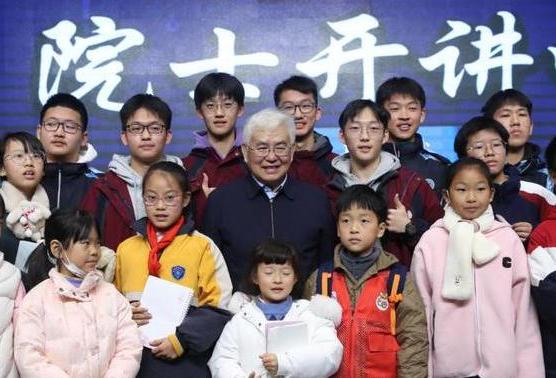Ningbo’s Drive to Foster Science Literacy & Talent Starts from Schools

By Quan Jiye & Zhuang Peijun
What is a supercomputer? What can it do? And is it any threat to humans? These were some of the topics Zheng Weimin, an academician at the Chinese Academy of Engineering and a professor in Tsinghua University's computer science and technology department, explained to school students in Ningbo, Zhejiang province in east China, recently.
Zheng was speaking in the fourth session of the “Academicians Open the Lectures” series in Ningbo, renowned as the “hometown of academicians” in China. Over 120 academicians from the city rank among China’s best. The "Academicians Open the Lectures", a tailored extracurricular series for primary and secondary students held once a month, taps into the expertise of these scholars to bolster scientific literacy and cultivate innovative talents. Previous sessions featured academicians sharing their insights on topics ranging from quantum satellites to exploring the stars and the oceans.
Zheng’s popular science lecture, titled "National Top Important Equipment—Supercomputing Systems", explained what a supercomputer was, its features and applications in daily life. He also spoke about the achievements of China's supercomputing systems and the challenges, highlighting the shift from an era where humans, animals and power (electricity) were the primary means of productivity to the current era, where "computing power is productivity," marking the core of the digital economy.
The presentation emphasized that computing power doubles every 12 months, and every one yuan invested can drive three-four yuan of GDP growth. More than 400 primary and secondary school students from the city attended the lecture, while nearly one million primary and secondary school students watched the live broadcast. The talk broadened their vision, increased their knowledge and ignited their curiosity, imagination and desire to explore science.
In addition to the lectures, Ningbo also became part of the "Sky Classroom" for primary and secondary school students last year. The first three lessons of the "Sky Classroom" were presented by astronauts in orbit. In 2023, Ningbo, Beijing, Alxa League in Inner Mongolia, Yan'an in Shaanxi, and Tongcheng in Anhui were chosen as the five ground classrooms for the fourth lesson of the "Sky Classroom." Through sky-ground teleconnection and interactive live broadcasts, it marked the first direct dialogue with astronauts aboard the Shenzhou-16 mission.
At the Ningbo Art Experimental School of East China Normal University, where the ground classroom is located, the students and teachers conducted a synchronous comparative experiment, experiencing the differences between space and Earth.
The "space teachers," astronauts Jing Haipeng, Zhu Yangzhu, and Gui Haichao, spoke about their work and life in Mengtian, the segment in the three-module space station that is the laboratory. They also demonstrated some space science experiments and cutting-edge equipment. The direct communication with astronauts more than 400 kilometers above the earth's surface was an exciting moment for the youngsters and perhaps sowed the seed of science in many young minds.
Ningbo also organizes various science and technology events, such as the National Science and Technology Week, National Science Popularization Day, National Youth Aerospace Innovation Competition, the Youth Computer Robot Competition, and Zhejiang Mind Olympics Competition. It has pioneered a comprehensive training mechanism that extends from primary and secondary schools to the college-university level and promotes collaboration between schools, families and society. Through various initiatives, the city has achieved outstanding results in nurturing students' interest and literacy in science.
On September 27, 2023, the Education Bureau, Science and Technology Bureau, and Ningbo Association for Science and Technology cooperated to initiate a science education program for primary and middle school students. The objective is to expand the advantages of the "hometown of academicians" as a science education brand, improve scientific literacy, cultivate outstanding innovative talents and contribute to developing talent in Ningbo's manufacturing industry. Ningbo’s resources as the "hometown of academicians" will be the base, and school science education the main field. External scientific education resources will be leveraged and a mechanism will be built for coordinated promotion of science education both in and after school.
The program emphasizes overall participation, relying on collaboration between schools and other organizations. While seeking to promote teachers’, students’, and parents’ awareness of scientific education, it also focuses on individual development and personalized teaching. Special attention is given to cultivating students with prominent scientific literacy and strong interest in technology.
While leveraging the role of schools as the main hub for science education, it facilitates collaboration with external resources, and advocates academicians, scientists and technology experts participate in primary and secondary science education. The aim is to create an integrated educational environment that involves collaboration between schools, families and the broader community.
Through pilot projects, promotion, evaluation, feedback for improvement, and comprehensive enhancements, a high-quality system of primary and secondary school scientific education will be constructed.
The framework of the program is "Four Enhancements and One Improvement": Strengthening the role of schools as the main battlefield for scientific education, enhancing the construction of the science education teacher team, improving experimental teaching in primary and secondary schools, strengthening the ability to discover outstanding innovative talents, and enhancing the ability to cultivate them.
These objectives are to be achieved with four "100" projects: 100 innovative laboratories will be established, 100 science innovation teachers will be trained, 100 excellent science courses will be designed, and 100 typical science practice (events) will be refined. The initiative aims to develop a batch of experimental schools with a distinctive science education feature, leading to a substantial improvement in the scientific literacy of all students and the discovery and efficient cultivation of outstanding innovative talents.
The program aligns with the implementation of the "Opinions on Further Strengthening Science and Technology Popularization in the New Era" and specific actions outlined by the Ministry of Education and 18 other ministries. This policy provides essential support for strengthening scientific education in primary and secondary schools in Ningbo, serving as a valuable reference for scientific education initiatives across the country.







